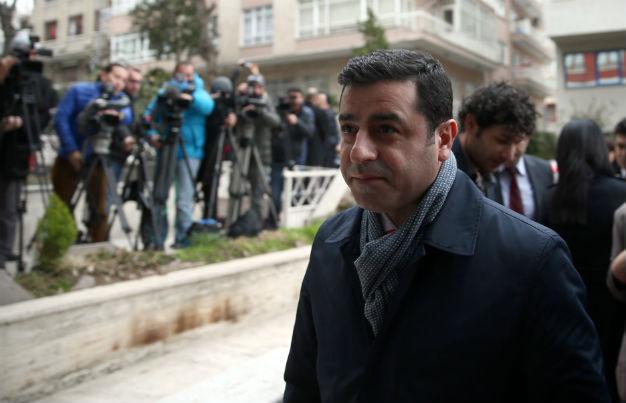Academics calling for peace ‘conscience’ of Turkey: HDP
ANKARA

AA photo
Academics and intellectuals who publicly called on the Turkish government to end security operations in southeastern Anatolia and return to the table for talks to resolve the Kurdish issue are the “conscience of the country,” a co-chair of the Peoples’ Democratic Party (HDP) has said.
“There is not a single societal segment that has not been insulted and belittled by President [Recep Tayyip Erdoğan],” HDP co-leader Selahattin Demirtaş told reporters on Jan. 13, a day after the former labeled more than 1,000 national and international academics as “poor excuses for intellectuals” for daring to criticize the government’s military operations.
“You know that since he is one of the distinguished academics of our country, he has a lot of honorary doctorate degrees … I wonder what his university life was like; nobody knows about it,” Demirtaş said, mocking Erdoğan.
“Asking for peace in this country and saying no to bloodshed was the main slogan of the ‘resolution process’ for which he said he would do anything, including ‘drinking hemlock’ until a year ago,” he said, referring to Erdoğan’s earlier remarks that “he would do anything to resolve the [Kurdish] issue,” including drinking poison.
“People should not be afraid of asking for peace,” he said. “The academic world should be free; they cannot work by taking orders and instructions from either the president or YÖK [the Supreme Education Board]. I believe that the academics and the intellectuals who released the declaration are the conscience of the country,” he stated.
Some 1,128 academics from 89 different universities – including foreign scholars like Noam Chomsky, David Harvey and Immanuel Wallerstein – signed the declaration titled “We won’t be a part of this crime,” which called on Ankara to end the “massacre and slaughter.”
Erdoğan, in an address to Turkish ambassadors gathered for an annual conference, lashed out at the signatories and said human rights violations in the southeast were being committed by “terrorists,” referring to militants of the outlawed Kurdistan Workers’ Party (PKK), but not by the state.
Immediately after the speech, YÖK also issued a statement on the academics’ declaration.
“The declaration issued by a group of academics that describes our state’s ongoing struggle against terror in the southeast as ‘massacre and slaughter’ has put our entire academic world under suspicion,” read the statement issued by YÖK, adding that all rectors and an inter-university council would soon meet to discuss the issue.
The rector’s office at Kayersi’s Abdullah Gül University demanded that Bülent Tanju, a professor at the school, submit his resignation for signing the list.
Sedat Peker, a former mafia leader and ultranationalist who has given strong backing to Erdoğan, also said they “would cause the [academics’] blood to flow in streams before taking a shower in their blood” in a message posted on his website.
Meanwhile, Demirtaş noted that the closure of the Democratic Society Party (DTP) and its predecessors was unlawful, when asked about a top European human rights court ruling on Jan. 12 that condemned Turkey for dissolving the DTP – a predecessor to the HDP – in 2009 for alleged ties to militants of the outlawed Kurdistan Workers’ Party (PKK).
“Turkey has never made decisions in line with the law and the European Convention on Human Rights when the issue is party closures,” he said.
